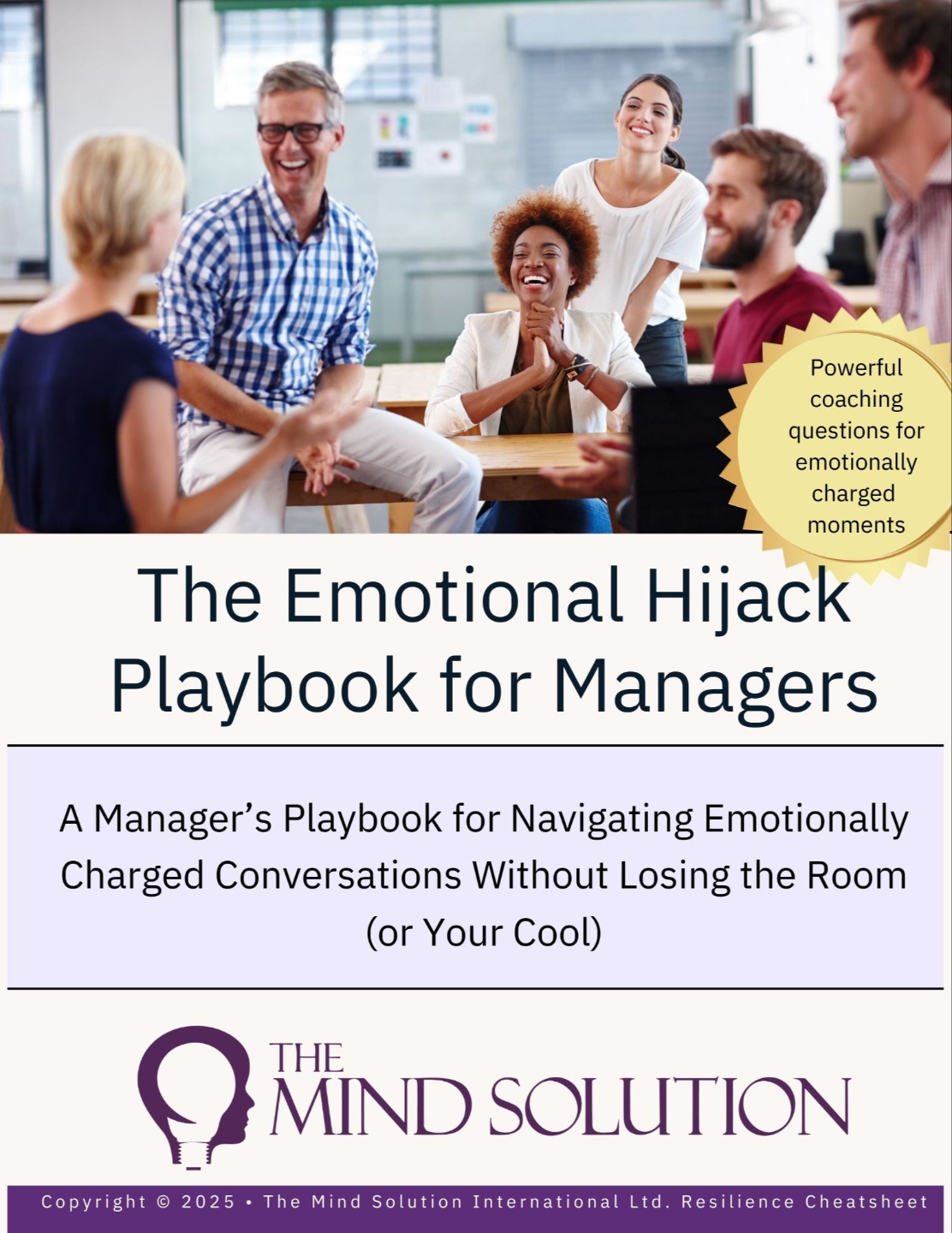Why Resilience Is Important for HR Leaders
Nov 03, 2025
When I first began to deliver training, one of the first programmes I created was emotional resilience training for HR teams. The reason for this was twofold.
I’d worked closely with several forward-thinking HR leaders who had heard me talking about everything I was learning while studying solution-focused psychotherapy. They’d listened to me speak about what resilience really means, how we build healthy working habits, emotional hijacking, and the neuroscience of stress.
It was from those conversations that, when I left my corporate HR career to set up my own business, these HR leaders were the first to invite me back — asking me to deliver emotional resilience training to their HR teams.
For me personally, helping HR teams develop emotional resilience was something deeply close to my heart, having spent more than a decade working in HR myself.
While every department faces its own pressures — sales chasing targets, finance managing budgets — the role of an HR leader demands emotional resilience because of the nature of the work.
I’ve lost count of the number of restructures, redundancies, and change initiatives I supported during my career. The sheer number of people I sat with to deliver news that would change their lives. The tears, the shock, the anger, the fear.
And it doesn’t end there. HR is often at the centre of employee relations cases — the tangled web of human emotion and behaviour that lies behind every policy and process. HR professionals aren’t just following procedure; they’re dealing with the complexity of what it means to be human in this world.
While I was fortunate never to experience suicide in my HR role, I know many HR leaders who have. Who have taken that phone call, delivered that news, and then had people turn to them asking, “What do we do now?”
HR often becomes the informal therapist, the trusted confidant, the quiet listener for others’ pain, betrayal, anger, and grief. Without realising it, HR can absorb it all — like a sponge taking in everyone else’s emotion.
And without emotional resilience, it’s no wonder so many people in HR experience burnout.
What Resilience Really Means
But when it comes to understanding what resilience means, my sense is that the word itself has become a little muddied.
Some people see resilience as pushing through — continuing despite the circumstances, facing adversity with gritted teeth. And yes, I’ve known employees who saw that as a badge of honour: the ability to keep going no matter what.
But when that pushing through comes at the cost of your mental and physical health, that’s not resilience.
The truth is, we all have an innate resilience. But our ability to operate from that natural state depends on the inner structure that we’re running our lives by — the conditioned thoughts, emotional responses, and behaviours operating at the level of the unconscious mind more than 95% of the time.
If, as an HR leader, you’re trying to navigate your day from a dysregulated nervous system, burnout will come quickly.
We can teach people resilience from the level of tips and best practices — mindfulness, movement, boundaries — but why is it that when we’re under pressure, those best practices suddenly vanish? Why do they become tumbleweed the moment we need them most?
From my perspective, it all comes down to that inner infrastructure.
I’ve seen HR teams run on patterns like:
-
“I’ve got to prove myself,” especially in male-dominated environments.
-
“It’s not safe to slow down.”
-
“I can’t rely on others.”
Many of these beliefs are formed early in life — through experiences that taught us hyper-independence or perfectionism as survival strategies.
These unconscious structures run the show. And if we’ve never developed the self-awareness to see them, we can’t change them.
Without bringing awareness to these patterns — and transforming them at the level of the mind and body — they remain automatic, conditioned responses.
So even when we know intellectually that taking a break, getting fresh air, or setting boundaries would support our wellbeing, under pressure, we’ll default to the old programming.
One reason for this is simply how the brain works. The brain is wired for survival, not for thriving. It takes the path of least resistance — the familiar neural pathways. So, unless we’ve embedded new, healthier habits into that inner infrastructure, resilience techniques will only ever sit at the surface.
Resilience for Leaders Starts From Within
I know from my own experience how much I loved my HR career. But what I now also have is a deeper understanding of the human psyche — and how we can experience true emotional resilience and mastery.
How can we continue to show up each day regulated, calm, and clear, doing what we love without sacrificing our health or peace of mind?
Many surveys now show HR leaders questioning how long they can keep going. They love their work, but they also know the way they’re operating isn’t sustainable.
If you’re reading this and that resonates — that recognition itself is something to celebrate.
Because awareness is the turning point. Most people continue to power through, even when the red flags are waving, until they reach the moment when it’s simply too painful to stay the same. That’s often when breakdown or burnout happens — when the body finally says, “I can’t do this anymore.”
Over the past 13 years, I’ve worked with countless leaders who’ve lived in burnout or anxiety for years before finally seeking change.
And many people still hold onto the hope that things will “calm down” or “get better” on their own. But as Einstein famously said, “The definition of insanity is doing the same thing over and over again and expecting a different result.”
The good news? Change doesn’t have to be painful.
Creating Lasting Emotional Resilience
It’s one of the reasons I created The HR Reset — a space for HR professionals to create real change in the underlying infrastructure of the mind and body.
A space that supports you, holds you, and helps you access your natural resilience.
During these 90-minute sessions, you don’t have to talk, have your camera on, or share anything. Using a neuroscience-backed technique that works with the unconscious mind, we gently reprogramme the patterns that have been innocently working against you.
These sessions don’t need to be paid for by your organisation — you can attend privately. Because true emotional resilience isn’t about productivity hacks or surface-level tools.
It’s about working with the unconscious structures in the brain and nervous system so you can keep doing what you love — without the cost to your health.
The Emotional Hijack Playbook For Managers
A Manager’s Free Resource for Navigating Emotionally Charged Conversations Without Losing the Room (or Your Cool).
Perfect to use in your next one-to-one.






